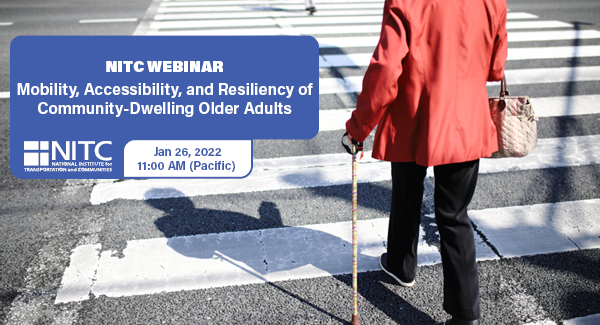
PRESENTATION ARCHIVE
OVERVIEW
Mobility disparities among older adults affect their ability to travel and access services. This project seeks to understand challenges, barriers, and gaps that older adults experience and to develop forms of assistance or educational strategies to fill the varying mobility gaps and meet the mobility needs. This study characterizes older adults’ use of existing and potential transportation options, including conventional transit, paratransit, and ride-hailing systems, based on surveys and interviews collected from community-dwelling older adults in Dallas, Texas. Through the interview during the pandemic, the research team found that perceptual and knowledge barriers appear to be reduced among older adults to adopt new mobility options such as ride-hailing although financial and technology barriers still exist. Based on the findings, we discussed several strategies that can potentially reduce observed barriers and challenges and enhance mobility to ultimately increase social equity across transportation-disadvantaged populations, particularly among low-income older adults.
KEY LEARNING OUTCOMES
- The audience will evaluate older adults’ actual usages, awareness, willingness to utilize, and any associated challenges and barriers to access available transportation options.
- The audience will identify factors enhancing resilience among marginalized older adults during the COVID-19 pandemic.
- The talk will demonstrate how older adults’ heterogenous characteristics, expectations, motivations, and goals influence their satisfaction with different transportation options.
THE RESEARCH
This webinar is based on a study funded by the National Institute for Transportation and Communities (NITC) and conducted at the University of Texas at Arlington. Read more about the research: Developing Strategies To Enhance Mobility And Accessibility For Community-Dwelling Older Adults.
SPEAKERS
Kate Hyun, University of Texas at Arlington
Dr. Hyun is an assistant professor in the Department of Civil Engineering at UT Arlington. Her research centers on big data analytics using Intelligent Transportation Systems technologies for various applications including community mobility modeling, traffic monitoring and operation, freight transportation planning, safety, and travel behavior study. In recent five years, she served as the PI or co-PI over 20 interdisciplinary projects. She seeks to explore how professionals in different fields could interact around issues of transportation and transportation equity and to identify opportunities for enhanced collaboration and training in anticipation of emerging transportation needs for disadvantaged communities.Caroline Krejci, University of Texas at Arlington
Dr. Krejci is an assistant professor in the Department of Industrial, Manufacturing, and Systems Engineering at UT Arlington. She holds a Ph.D. in Industrial Engineering from the University of Washington. Dr. Krejci’s research focuses on developing quantitative methodologies for the analysis and sustainable management of complex sociotechnical systems, including regional food supply networks, food recovery networks, crowd logistics systems, and urban communities. She is particularly interested in finding ways to adapt traditional industrial engineering techniques and tools to improve the efficiency, effectiveness, and resilience of decentralized production and distribution systems. She previously worked at UPS, Lutron Electronics, and Iowa State University.Kathy Lee, University of Texas at Arlington
Dr. Lee is an assistant professor in the School of Social Work at UT Arlington. She is a licensed social worker and an applied researcher whose primary research goal is to create healthier, more equitable communities for vulnerable and marginalized older adults and their family caregivers. She is particularly interested in psychosocial interventions and community-based supports to improve the health and well-being of older adults. She is also interested in identifying disparities in health and health care systems by focusing on underrepresented populations in the field of aging. She was recently involved in two funded research projects regarding community mobility of transportation disadvantaged older adults.PROFESSIONAL DEVELOPMENT
This 60-minute webinar is eligible for 1 hour of professional development credit for AICP (see our provider summary). We provide an electronic attendance certificate for other types of certification maintenance.
LEARN MORE
Photo by bee32/iStock
Sign up for our newsletter to get updates on our events.
This webinar is hosted by the Transportation Research and Education Center (TREC) at Portland State University. The research was funded by the Summit Foundation and the National Institute for Transportation and Communities (NITC), a program of TREC and one of five U.S. Department of Transportation national university transportation centers. The NITC program is a Portland State-led partnership with the University of Oregon, Oregon Institute of Technology, University of Utah and new partners University of Arizona and University of Texas at Arlington. We pursue our theme — improving mobility of people and goods to build strong communities — through research, education and technology transfer.



